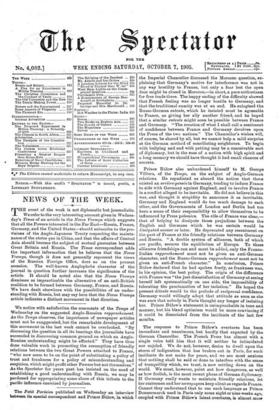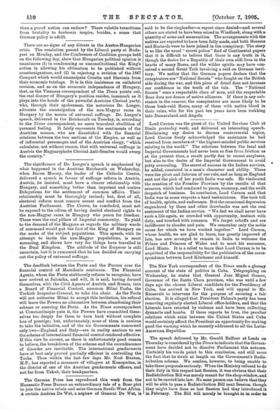Prince Billow also unburdened himself to M. George Villiers, of
the Temps, on the subject of Anglo-German relations. He repudiated as absurd the notion that there existed an arra re-pensee in Germany, tending to induce France to side with Germany against England, and to involve France in a conflict alleged to be inevitable. He did not believe in this war, and thought it stupidity to announce it as inevitable. Germany and England would do too much damage to each other, and the Governments of London and Berlin had too keen a sense of their responsibility to allow themselves to be influenced by Press polemics. The r6le of France was clear,— that of helping to dissipate those prejudices between the English and Germans which he was certain would be dissipated sooner or later. He deprecated any resentment on the part of France at the friendly relations between Germany and Russia. "A double system of alliances, both of which are pacific, secures the equilibrium of Europe. To these alliances friendships can and must be added, only the Franco- Italian rapprochement must not be given an anti-German character, and the Russo-German rapprochement must not be given an anti-French character." In conclusion, Prince Billow declared that he had spoken freely, as frankness was, in his opinion, the best policy. The origin of the difference with France was "the just dissatisfaction of Germany at seeing herself left systematically on one side, the impossibility of tolerating the proclamation of her isolation." He hoped the present detente would be the prelude of reciprocal confidence. Germany would willingly adopt that attitude as soon as she was sure that nobody in Paris thought any longer of isolating her. Prince Billow's statement is unimpeachable in tone and manner, but his bland optimism would be more convincing if it could be dissociated from the incidents of the last few months.
The response to Prince Billow's overtures has been immediate and unanimous, but hardly that expected by the German Chancellor. The French Press has almost with a single voice told him that it will neither be intimidated nor cajoled. We do not, however, desire to dwell upon the storm of indignation that has broken out in Paris, for such incidents do not make for peace, and we are most anxious that nothing shall be said or done to interfere with the sense of tranquillity which, we trust, is now settling down on the world. We must, however, point out how dangerous, aa well as how foolish, is the most recent phase of German diplomacy. If Germany really wants to maintain friendly relations, let her statesmen and her newspapers keep silent as regards France. Cannot they understand that to use such language as Prince Donnermarck used in Paris only some eight or nine weeks ago, coupled with Prince Billow's latest overtures, is almost most than a proud nation can endure ? These volatile transitions from brutality to bonhomie inspire, besides, a sense that German policy is adrift.
There are no signs of any détente in the Austro-Hungarian crisis. The reselution passed by the Liberal party at Buda- pest on Monday, and the Conference of Coalition groups held on the following day, show that Hungarian political opinion is unanimous (1) in condemning as unconstitutional the King's action in allowing his ultimatum to be published without countersignature, and (2) in rejecting a revision of the 1867 Compact which would emancipate Croatia and Slavonia from their economic tutelage. It is in this insistence on unilateral revision, and so on the economic independence of Hungary, that, as the Viennese correspondent of the Times points out, the real danger of Hungary's position resides, inasmuch as it plays into the hands of the powerful Austrian Clerical party, who, through their spokesman, the notorious Dr. Lueger, advocate the emancipation of the non-Magyar races in Hungary by the means of universal suffrage. Dr. Lueger's speech, delivered in the Reichsmth on Tuesday, is, according to the Times correspondent, no mere truculent ebullition of personal feeling. It fairly represents the sentiments of the Austrian masses, who are dissatisfied with the financial relations between the two sections of the Empire, as well as of influential personages and of the Austrian clergy, "which calculates, not without reason, that with universal suffrage in Austria the Magyarophobe Clerical Anti-Semites would sweep the country."



























































 Previous page
Previous page